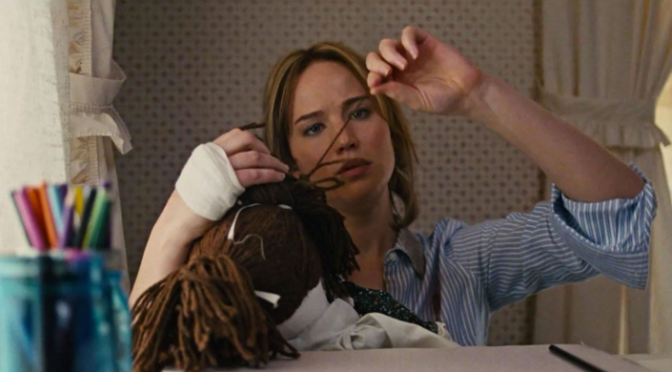It’s the struggle that no one knew they wanted to see onscreen: that of Miracle Mop inventor Joy Mangano (Jennifer Lawrence), a constantly striving to make ends meet single mother who gave up on her imagination and dreams of greatness as a youth, around the time her parents divorced–at least according to the David O. Russell stylization of her life in Joy.
Because it’s been such a long time since audiences have been exposed to a truly relatable-in-her-strife, based-on-a-true story-heroine, Joy seems to come at a time when we need her most. In fact, the last time we saw a protagonist as underdog-like in nature was fifteen years ago in Steven Soderbergh’s Erin Brockovich. Mimicking the same background as Joy, Erin (Julia Roberts), too, is a single mother searching for a way to support her kids using the minimal formal education she’s had with the maximum shrewdness that she was born with. And, like Joy, she must face obstacle after obstacle in order to achieve even the most preliminary level of her aspirations. After being divorced for two years and allowing her husband, Tony (Édgar Ramírez), to live in her basement out of kindness/as a way to help her out with caring for their two children, Christie (played by twins Aundrea Gadsby and Gia Gadsby) and Tommy (played by other twins Tomas Elizondo and Zeke Elizondo), it’s clear that her life has become something of a shambles. When she’s not putting out a fire for her children as she’s on her way out the door to work at a low-budget airline ticket counter, she’s helping her mother, Terri (Virginia Madsen, looking in quite a different state than, say, Sideways), perform basic tasks as she’s engrossed in a quintessentially trashy soap opera or lending a hand to her father, Rudy (Robert De Niro), a mechanic who owns a garage and also has a daughter from another marriage, Peggy (Elisabeth Röhm), that despises Joy with every fiber of her being.
The only true beacon of light in her entire life is her grandmother, Mimi (Diane Ladd, continuing the sweeping array of soap opera references), a matriarchal type who narrates the story and truly believes in Joy’s talents and specialness. Inhabiting that bizarre part of New York called Long Island, Joy is part of the ilk that ends up on a path toward working class mediocrity, just as Brockovich hailed from the nowhere town of Lawrence, Kansas and “peaked” around 1981 when she won the Miss Pacific Coast beauty pageant. This type of “success” so early on for both women leads to a false sense of confidence that gets shattered to pieces when the crushing weight of adult disappointment begins to compress their dreams. For Joy, her belief in the magic of her inventing capabilities–of being able to give people what they want–is what propels her forward until the negative energy of her parents warring and the jealous hatred of Peggy wears her thin. It is only after meeting a”big band” singer who claims he’s going to be “the next Tom Jones,” Tony (Édgar Ramírez), at a party her best friend, Jackie (Dascha Polanco), invites her to that Joy begins to feel momentarily like she’s shining again.
But, of course, just as Erin’s relationship with George (Aaron Eckhart), things inevitably turn sour, and Joy and Tony end up being better off as friends than marriage partners. In fact, it is Tony who tries to save her the heartache of listening to the advice of Rudy’s wealthy girlfriend, Trudy (Isabella Rossellini, killing it as usual), an investor/widow that Joy convinces to finance the prototype of her mop–drawn out in crude crayon blueprints with the help of her daughter.
The amount of times Joy is told no in the movie is heartbreaking; and though it’s hard to know for sure how much was dramatized for the purpose of inspiration versus reality, it’s not hard to believe that Joy was forced to kowtow to men like Neil Walker (Bradley Cooper, completing the David O. Russell trifecta of casting) at every turn just to gain even the slightest inch of headway in the business world.
Joy’s gradual rise from the ashes of failure (made evident by comments about how she’s just “a bored unemployed housewife” deluding herself into thinking she has any business acumen–said by her own father no less) are gut-wrenching to watch. Indeed, the audience almost–almost–believes she might not actually triumph as Russell saves this reward for the very last act. And although the film borders on a more maudlin side than Brockovich’s biopic (there is, after all, a musical number of Frank and Nancy Sinatra’s “Something Stupid” sung by Tony and Joy), the tough-as-nails, won’t give up attitude is just as present in Joy. Plus, Russell throws in a Citizen Kane “Rosebud” moment at the end and lets Melissa Rivers use her only skill in life (playing Joan Rivers).





















